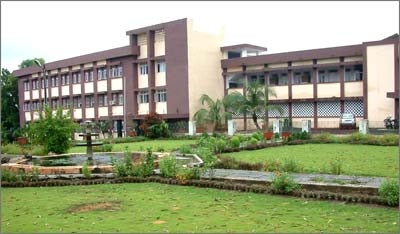The State Forest Research Institute, Jabalpur (SFRI) came into existence on 27th June, 1963 for the scientific development of forestry sector in the state of Madhya Pradesh following the recommendations of tenth Silvicultural Conference held at Dehradun in 1961. It was granted autonomy on 29th October, 1994 and was registered on 2nd August, 1995 as a society under M.P. Societies Registration Act 1973. Over the years the institute has developed as a educational, training, research and consulta ncy organization at the state and national level and is carrying out need based adaptive and applied research programmes for the Forest Department as well as forest dependent communities. The research programmes are focused on tropical forestry, environment, wildlife, agro forestry, biotechnology and biodiversity conservation. The vision of SFRI is to function as nodal centre of research in forestry and to provide scientific support to the state and its people on matters related to forestry, wildlife and climate change with particular emphasis on conservation, sustainable utilization and scientific management of natural resources. The institute conducts multidisciplinary forestry & wildlife research and provides technical advice to the practical problems that are encountered by the field foresters. It also disseminates research findings through training, education, seminars, workshops, participation in public fairs and consultancy services. Technical bulletins, series of pamphlets, brochures and journal namely ‘Van-Dhan Vyapar’ is published quarterly Vandhan Vyapar provide informatics preveling market need of NTFPs in mandis and the trade in the communities. The Journal of Tropical Forestry is also published from the institute campus by the Society for Tropical Forestry Scientists comprising of senior forest officers and scientists from the state and all over the country. The journal carries technical research papers, articles and research recommendations of forestry projects undertaken by various organizations.
ncy organization at the state and national level and is carrying out need based adaptive and applied research programmes for the Forest Department as well as forest dependent communities. The research programmes are focused on tropical forestry, environment, wildlife, agro forestry, biotechnology and biodiversity conservation. The vision of SFRI is to function as nodal centre of research in forestry and to provide scientific support to the state and its people on matters related to forestry, wildlife and climate change with particular emphasis on conservation, sustainable utilization and scientific management of natural resources. The institute conducts multidisciplinary forestry & wildlife research and provides technical advice to the practical problems that are encountered by the field foresters. It also disseminates research findings through training, education, seminars, workshops, participation in public fairs and consultancy services. Technical bulletins, series of pamphlets, brochures and journal namely ‘Van-Dhan Vyapar’ is published quarterly Vandhan Vyapar provide informatics preveling market need of NTFPs in mandis and the trade in the communities. The Journal of Tropical Forestry is also published from the institute campus by the Society for Tropical Forestry Scientists comprising of senior forest officers and scientists from the state and all over the country. The journal carries technical research papers, articles and research recommendations of forestry projects undertaken by various organizations.
The institute is located at Jabalpur in a lush green campus spread over a sprawling area of about 102 ha. The region of Jabalpur has close proximity to two major forest types, namely; sal and teak forests of Madhya Pradesh and four protected areas (PA’s) namely; Kanha, Bandhavgarh, Pench and Satpuda. This unique location rendered it suitable for the setting this institute here. It houses a rich infrastructure of various research and experimental plots, research nursery, ornamental nursery, clonal nursery, medicinal and aromatic plants nursery, rose garden, seasonal garden, lac, gene-bank, mist-chambers, shade-net houses, poly houses, botanical garden, bambusetum, tissue culture, The administrative block, houses fully renovated state of art EIA, soil and seed testing laboratories, a mobile soil testing laboratory. conference halls, lecture room, museum, herbarium, auditorium, library and documentation centre and the laboratroes. The hostels and officers’ rest house, provides furnished accommodation and is renovated now. The institute also provides residential accommodation to its employees inside the campus.
 Govt. Diary/Calendar
Govt. Diary/Calendar
 Govt. Diary/Calendar
Govt. Diary/Calendar

 Govt. Diary/Calendar
Govt. Diary/Calendar
